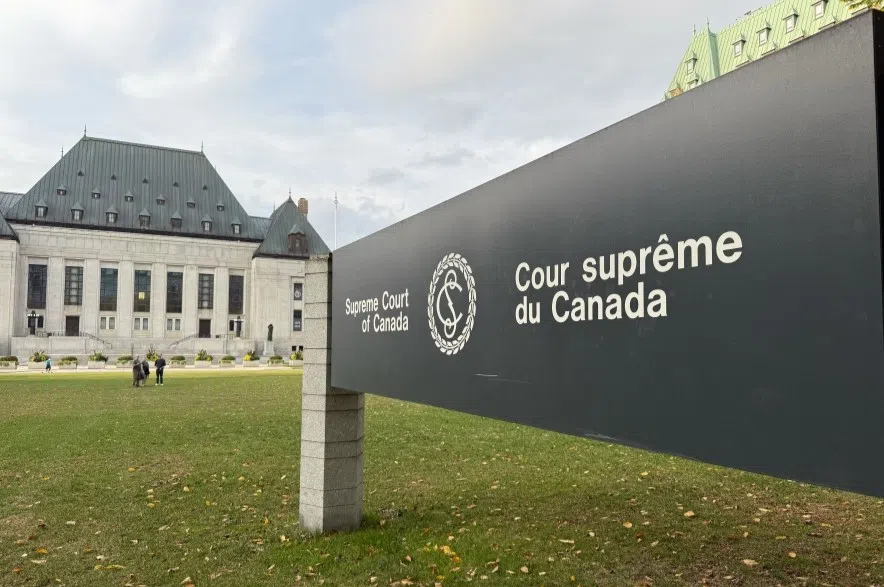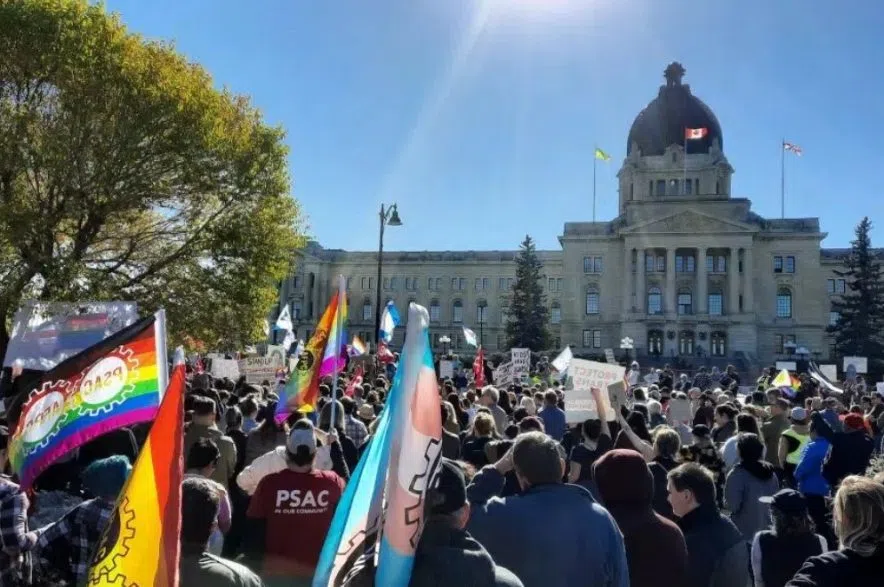The provincial government and UR Pride are glad the Supreme Court will hear appeals in a challenge of Saskatchewan’s pronoun law.
The law prevents children under 16 from changing their names or pronouns at school without their parents’ consent.
It was challenged by UR Pride, a 2SLGBTQIA+ group, whose lawyers argued it caused irreparable harm to gender diverse youth.
No date has been set for Canada’s top court to hear the appeals.
In 2023, Premier Scott Moe invoked the Charter’s notwithstanding clause to implement the legislation.
On Thursday, Moe said he was pleased to see the appeal hit the Supreme Court’s desk.
“It’s good, we asked for them to hear the appeal, and they’re going to hear it, so we’ll see what the result of that is,” he said.

Moe said government was instructed by its lawyers to take it to Canada’s top court after the Saskatchewan Court of Appeal ruled it could continue earlier this year. (Gillian Massie/980 CJME)
Bridget O’Brien, the executive director for UR Pride, said she’s happy the Supreme Court decided the appeal is worth hearing.
“We feel confident in an outcome that will support trans and queer youth,” she said.
The Saskatchewan Court of Appeals ruled the challenge could continue earlier this year, despite the government’s lawyers arguing it should be thrown out when it invoked the clause.
It also ruled that UR Pride can still argue the law be struck down because the clause wasn’t applied to Section 12 of the Charter — the right to be free from cruel and unusual treatment. The province cited other sections when it invoked the clause.
“This is no longer about just Saskatchewan youth,” O’Brien said. “This is about all of the nation’s youth and protecting their rights and defending them.”
The group and the province both appealed and asked Canada’s highest court to expedite the case to be heard alongside a challenge to a Quebec law that prevents public sector workers from wearing religious symbols on the job.

The Supreme Court of Canada says it will hear appeals in a challenge of Saskatchewan’s school pronoun law. (Nicole Garn/980 CJME)
Quebec also invoked the notwithstanding clause in its law.
“This is a space where Quebec has a lot more experience than us in not only the use of the notwithstanding clauses,” Moe said. “They’ve used it more than all other provinces added up.”
Justice Minister Tim McLeod feels the use of the notwithstanding clause “does not trample on rights.”
“When the courts wade into the democratic process, that’s them wading into the legislative branch and we do suggest that’s inappropriate,” he said.
Nathaniel Teed, NDP critic of labour and 2SLGBTQ affairs, said he doesn’t want to see the notwithstanding clause imposed unilaterally and wants the courts to be able to analyze new laws.
“We want to see those processes continue and respect the important feedback that the judiciary has when analyzing legislation that’s coming out of our legislatures,” he said.
Eleven parties have been approved to intervene in the provincial government’s appeal of a Court of King’s Bench decision on its controversial pronoun law.
Nathaniel Cole, a strategic advisor at the Saskatchewan Federation of Labour, said it intervened to stand up for workers’ rights, and more broadly, all human rights.
“As we look into the future, we want to think about the ways in which we uphold the Charter and the times at which the notwithstanding clause is used appropriately,” he said. “It’s time for the Supreme Court to perhaps provide some guidance on what that might look like.”
In an emailed statement from CUPE Saskatchewan, it welcomed the Supreme Court’s decision to hear the challenge.
“It is important for the courts to test the increasing use of the notwithstanding clause by provincial premiers trying to further their own political agendas,” said Kent Peterson, president of CUPE Saskatchewan, via email.
“We expect the court will agree with the Saskatchewan Court of Appeal that where a government uses the notwithstanding clause, courts can still review and comment on whether the law violates important Charter rights.”
— with files from the Canadian Press











